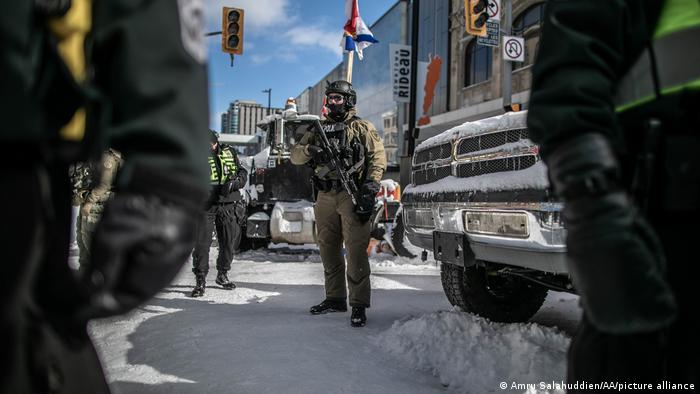
Ottawa police moved Friday to shut down the protests that have blocked off streets in the downtown area of the capital and inspired similar copycat actions elsewhere in the world, arresting more than 100 and towing numerous vehicles.
Ottawa's interim police chief Steve Bell said, "We will run this operation 24 hours a day until the residents and community have their entire city back."
The 3-week-old polarizing protests ostensibly coalesced around pandemic restrictions and COVID vaccine requirements but have transformed into a wider anti-government movement.
On Monday, Canadian Prime Minister Justin Trudeau invoked emergency powers to deal with the blockade.
What are police doing to stop the protests?
Prior to Friday's effort, police sought to disrupt the protests with threats of fines or arrests. They did so to thin the crowd and in part out of fear of escalation or violence in and around the protest encampments. Those who remain are therefore likely to be more hardened in their views.
To carry out the operation, police set up 100 checkpoints to starve the protest community of food and fuel. On Friday, hundreds of police descended on downtown in the frigid cold where snow had just fallen.
At least one driver had his window smashed and a few were pulled from vehicles and taken into custody. Others who resisted were thrown to the ground and arrested.
Even after Friday's efforts to try and remove the protesters, dozens of trucks remained. Three of the most prominent organizers were arrested, including two Thursday and one Friday.
Police have offered that it could take days to remove the protesters.
How have protesters reacted to their receding encampment?
Police have worked to push the protesters toward parliament and clear streets of their presence along the way.
Protesters have also used shovels to build chest-high snow embankments there, forming an icy barricade.
On Friday afternoon, a steady stream of vehicles departed from Ottawa's Parliament Hill.
Those protesters remained linked arms and were energized in their encounters with police, but as dusk set in, the situation became more tense.
Kevin Homaund, a trucker from Montreal, told the AP news agency, "Freedom was never free," adding, "So what if they put the handcuffs on us and they put us in jail?''
Mark, a protester from Nova Scotia who would not give his last name, told Reuters news agency, "If they want to arrest me, I'll put my hands out, and they can twist-tie me up like everybody else here. We're going peaceful."
The protesters' umbrella group, which calls itself the "freedom convoy 2022," said, "We will continue to hold the line. We refuse to bow to abuses of power. The world is watching, Canada."